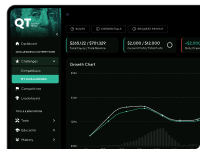Trading Instruments in Financial Markets: A Complete Guide | Quant Tekel
Explore the key instruments traded in financial markets with Quant Tekel. Learn about stocks, currency pairs, indices, commodities, and cryptocurrencies.
Instruments Traded in Financial Markets with Quant Tekel
In this lesson, we delve into the various instruments that are pivotal in financial markets and institutions. These include stocks, currency pairs, stock indices, commodities, and cryptocurrencies. Let’s explore their characteristics and what you need to know about each.
Stocks
A stock represents ownership in a company, granting the shareholder rights such as receiving dividends and participating in company management through voting rights. Stocks are traded to raise capital for companies and offer investors the potential for returns.
Types of Stocks
- Paper Shares: Physical stock certificates.
- Dematerialised Shares: Electronic records of stock ownership.
Stocks can be traded on exchanges or via CFDs, with notable examples including Microsoft and Apple. “Blue chip” stocks refer to large, stable companies that regularly pay dividends.
Currency Pairs
Currency pairs are traded on the forex market, the largest financial market with a daily volume of $7.5 trillion (2022 data). A currency pair consists of a base currency and a quote currency, such as EUR/USD, where the euro is the base and the dollar is the quote.
Currency pairs are categorised into majors, minors, and exotics, characterised by high liquidity and volatility. The EUR/USD rate at 1.12 means 1.12 USD is needed to buy 1 euro.
Stock Indices
Stock indices aggregate multiple stocks traded on an exchange, reflecting the economic segment or country’s market performance. Examples include the DAX, Dow Jones Industrial Average, and FTSE 100. Indices are generally stable investment instruments, gaining popularity for their reduced volatility compared to individual stocks.
Commodities
Commodities are standard goods traded without quality differences, such as crude oil, gold, and natural gas. Traders may speculate on price movements or purchase commodities for actual use. Commodity prices are influenced by factors like climate change, resource availability, and geopolitical events.
Cryptocurrencies
Cryptocurrencies are digital currencies, with Bitcoin being the most renowned. Other examples include Ethereum, Ripple, and Litecoin. Cryptos are known for their significant price volatility, offering both challenges and opportunities for traders. In 2021, Bitcoin’s price ranged from $29,000 to $64,000.

